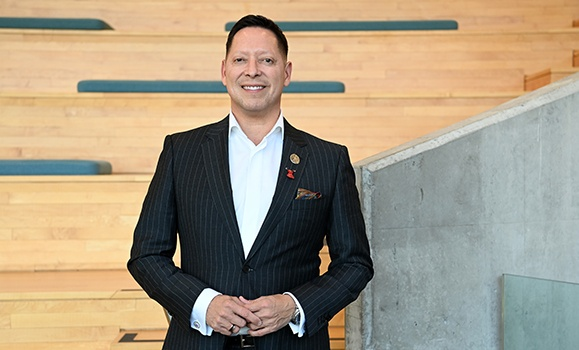As John R. Sylliboy steps into his new role as the university's first vice-provost of Indigenous Relations this week, he hopes to bring that word to life not just in greeting, but in action as well

John R. Sylliboy of Millbrook Mi'kmaw Community brings lived experience, academic insight, and decades of community-rooted leadership and advocacy to Dal's senior ranks. (Daniel Abriel photo)
"Dalhousie is always bringing people into its spaces," he says. "I'd like Indigenous people to feel that they can go into all parts of the university and experience that welcoming feeling."
For Sylliboy, the concept of Pjila'si encapsulates a broader mission of reconciliation, belonging, and systemic change.
It's a project he first embarked on many years ago. While Sylliboy's position at Dal officially begins today (May 20), you could argue his work with the university really began nearly 20 years ago.
Laying foundations
In 2007, Sylliboy took up a role with the Atlantic Policy Congress of First Nations Chiefs Secretariat. One of the Indigenous advocacy group's early collaborations was working with Dal to build capacity for Indigenous people working in health care so they could better serve their communities.
"That partnership laid the foundation for many future projects," says Sylliboy, who served as coordinator of the initiative.
Later roles as co-founder and executive director of the Wabanaki Two-Spirit Alliance an Indigenous collective that celebrates 2SLGBTQQIA+ communities and as a health research partner at the IWK Children's Hospital sparked further collaborations with Dal.
Sylliboy says he's witnessed progress in different areas at the university over the years, particularly in its support for Indigenous students across multiple disciplines.
There are students studying medicine from our own communities. That's something to celebrate.
"There are students studying medicine from our own communities," he says. "That's something to celebrate."
Education without borders
Despite his many connections to Dalhousie, Sylliboy never studied at the university.
He says his family and community encouraged him to pursue his educational ambitions, even when they carried him far away from home. In Costa Rica, where he moved as a young adult, Sylliboy completed an undergraduate degree in international relations at Universidad Nacional de Costa Rica.
He became the first Mi'kmaw student to graduate from university in a Spanish-speaking country.
"My family always pushed me and supported me," he says.
Sylliboy continued his formal education later back home, completing a Master of Education in Educational Foundations at Mount Saint Vincent University in 2018. His current PhD research through McGill University focuses on Two-Spirit identities and support for Two-Spirited youth.
While Sylliboy's own success as an academic trailblazer may serve as a model to a younger generation of Indigenous students, he acknowledges it's not always easy. Some students start their studies "full of hopes and dreams" only to become disillusioned when they hit barriers or don't see their identities or ways of knowing reflected.
"Don't be dissuaded or disillusioned by the challenges that may exist in certain classrooms and courses," he says, when asked what advice he would give to youth now.
A shared approach
As Sylliboy seeks to further support for Indigenous students as well as faculty and staff at Dal, he'll be doing so now from a different perspective inside the university.
Sylliboy's position sits within the Provost's Office at Dal, but he will be working closely with administrative units and Faculties across the university to address priorities found in the university's Indigenous Strategy. He'll seek to build stronger relationships with Indigenous communities and address systemic barriers facing Indigenous students, faculty, and staff.
"Integrating into Dalhousie is a new opportunity," he says. "I've always worked from our community, being on the outside. In this case, I'm going across the line and bringing these skills into a setting where we already have really solid perspectives around building pathways and restructuring foundations."
He knows this work will require many hands and a sense of shared responsibility between Indigenous and non-Indigenous people alike. Expecting Indigenous leaders to carry the entire burden of change simply doesn't work, he says.
"The reason people always get burned out is that they can't say no, and they take on all that responsibility. That's not my role. My role is to tap you and tap others to make sure that their sense of responsibility is just as important as my responsibility on campus."
New initiatives will take time to shape and there will be "speed bumps," he says. But that's okay.
"We can't look at this as a linear project with outcomes on a linear framework of five years," he explains. "I come from a collective consciousness that understands we've been here for a millennia plus. This role is a minuscule atom of an intervention that needs to be worked on, and when we get it right with Dal then hopefully we set an example."
Leading with the future in mind
Although he's now inside Dal, Sylliboy's goal is to bring community-based knowledge and experience into all that he does at the university. Engagement and continuous consultation with elders, youth, and community members are all priorities in this approach.
Sylliboy recounts a teaching from Elder Albert Marshall, who reminded him that their work is for seven generations into the future and not just for short-term institutional goals.
What we're doing today is not only for your nieces and nephews, but something that we're cultivating for 700 to 800 years in the future.
"What we're doing today is not only for your nieces and nephews," says Sylliboy, quoting Elder Albert, "but something that we're cultivating for 700 to 800 years in the future."
It's a big ask, Sylliboy admits, but one he's committed to.













